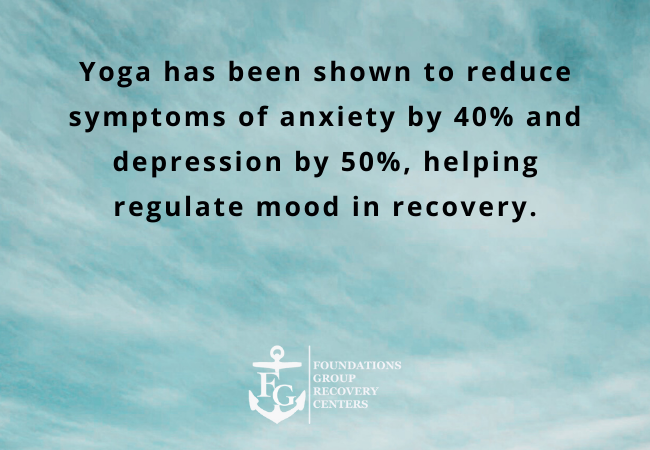At Foundations Group Recovery Centers, we understand that recovery is not just about stopping substance use—it’s about rebuilding a healthier, fuller life. For many, this means going beyond traditional therapy to address the deeper mind-body-spirit connection. Through our Holistic Addiction Treatment Program in Massachusetts, we combine clinical care with powerful holistic practices like yoga, meditation, and nutrition to promote true, lasting healing.
This article explores how these three pillars of wellness are essential components of recovery, and how they’re seamlessly integrated into our Outpatient Addiction Treatment, Day Treatment Programs, and Half Day Treatment Program in Massachusetts.
What Is Holistic Addiction Recovery?
Holistic addiction recovery is an integrative approach that focuses on treating the whole person—not just the symptoms of addiction. It recognizes that substance use disorders often stem from deeper emotional wounds, trauma, poor physical health, and disconnection from purpose.
Rather than relying solely on medication or talk therapy, holistic treatment combines conventional therapies with complementary practices such as:
- Yoga and mindful movement
- Meditation and breathwork
- Nutritional support
- Art and music therapy
- Acupuncture and massage
- Spiritual exploration and nature therapy
This type of care is especially valuable for those transitioning out of alcohol & drug detox in Massachusetts and into structured outpatient support.
Yoga: Restoring the Body and Reclaiming the Self
Addiction creates a disconnection between the mind and body. Individuals may feel detached from their physical form, experience chronic stress, or suffer from tension and fatigue. Yoga helps bridge this gap by reconnecting clients to their bodies through movement and breath.
Benefits of Yoga in Addiction Recovery:
- Reduces Stress & Anxiety:
Yoga promotes relaxation through deep breathing (pranayama) and gentle postures. This reduces cortisol levels and calms the nervous system, helping clients navigate early recovery with greater emotional control. - Improves Sleep Quality:
Many individuals in recovery struggle with insomnia. Yoga has been shown to improve sleep patterns by calming the mind and reducing muscle tension. - Increases Physical Strength and Flexibility:
Substance abuse can weaken the body. Yoga rebuilds physical health gradually and safely, especially for clients who are not ready for high-impact activity. - Improves Mind-Body Awareness:
Practicing yoga teaches clients how to recognize physical sensations, emotional triggers, and stress responses—an essential skill for preventing relapse. - Builds Self-Esteem:
By setting intentions and achieving small goals in each class, clients gain confidence and a sense of accomplishment, crucial for long-term healing.
Types of Yoga We Use:
- Hatha Yoga – Slow and gentle for beginners
- Yin Yoga – Deep stretching for emotional release
- Trauma-Informed Yoga – Designed for clients with PTSD or anxiety
- Restorative Yoga – Focused on healing, breath, and calm
Yoga is woven into both our Day Treatment Programs and Half Day Treatment Program in Massachusetts, giving clients frequent access to physical grounding and emotional reset.
Meditation: Quieting the Mind and Cultivating Awareness
Meditation is an essential tool in holistic recovery. It allows individuals to become aware of their thoughts, triggers, and cravings without acting on them. For clients healing from addiction, this practice can be life-changing.
Why Meditation Matters in Recovery:
- Improves Focus and Attention:
Substance use often impairs concentration. Meditation strengthens mental clarity and helps clients stay present in therapy and daily life. - Reduces Cravings and Impulses:
Mindfulness helps individuals observe cravings as temporary experiences, reducing the urge to react impulsively. - Supports Emotional Regulation:
Meditation teaches people to sit with uncomfortable emotions like guilt, shame, or anger without needing to numb them. - Enhances Self-Compassion:
Clients begin to treat themselves with kindness rather than judgment—key to overcoming internalized shame. - Balances Mood Disorders:
Meditation has been shown to alleviate symptoms of anxiety and depression, both common co-occurring disorders in addiction.
Meditation Techniques We Teach:
- Mindfulness-Based Stress Reduction (MBSR)
- Body Scan Meditation
- Guided Visualization
- Loving-Kindness Meditation
- Breath Awareness and Deep Breathing Exercises
At our Addiction Treatment Center in Massachusetts, meditation is incorporated into group therapy sessions, individual counseling, and daily rituals in our structured programs.
Nutrition: Rebuilding the Body from the Inside Out
Addiction often leads to poor nutrition—meals are skipped, junk food is consumed, and essential nutrients are depleted. Once a client begins recovery, restoring physical health is critical to long-term success.
How Nutrition Supports Recovery:
- Stabilizes Blood Sugar:
Fluctuating blood sugar can trigger irritability, cravings, and fatigue. A balanced diet keeps energy steady throughout the day. - Replenishes Nutrient Deficiencies:
Drugs and alcohol deplete key nutrients such as B vitamins, magnesium, zinc, and omega-3 fatty acids—essential for brain and nervous system function. - Supports Detoxification:
Nutrient-dense foods help the liver and kidneys flush out toxins more efficiently. - Improves Mental Health:
There’s a strong link between diet and mood. Healthy fats, whole grains, fruits, and vegetables boost neurotransmitter production, including serotonin and dopamine. - Boosts Immunity:
A weakened immune system is common in early recovery. A strong diet builds resistance to illness and supports vitality.
What Clients Receive in Our Programs:
- Personalized nutrition education and planning
- Anti-inflammatory meal recommendations
- Hydration tracking
- Mindful eating workshops
- Digestive health support (probiotics, gut healing)
- Meal timing and portion control strategies
Whether you’re in a Half Day Treatment Program or full-day program, nutrition is a cornerstone of care.
Integrating Yoga, Meditation & Nutrition in Day Treatment
Clients in our Day Treatment Programs in Massachusetts experience an integrative schedule that blends holistic and clinical practices. A sample day might include:
- Morning: Group therapy and relapse prevention
- Mid-morning: Guided meditation and journaling
- Lunch: Nutritious, dietitian-approved meal
- Afternoon: Yoga or creative expression
- Late day: Individual counseling and discharge planning
This rhythm supports mental focus, physical grounding, emotional healing, and real-world skill-building.

Addressing Dual Diagnosis Holistically
Many individuals suffering from addiction also struggle with co-occurring mental health disorders, such as depression, anxiety, PTSD, or bipolar disorder. Our substance use treatment programs in Massachusetts use holistic care to address both challenges simultaneously.
For example:
- Yoga can ease PTSD symptoms
- Meditation helps reduce panic attacks
- Nutrition stabilizes mood swings associated with bipolar disorder
Holistic care does not replace clinical therapy or medication—it enhances their effectiveness.
Personal Transformation Through Holistic Recovery
One of the most powerful aspects of holistic recovery is the transformation clients experience not just in body, but in identity. Individuals regain their sense of purpose, confidence, and self-love.
Client Outcomes Include:
- Improved self-esteem and body image
- Healthier relationships and boundaries
- Reduced cravings and relapse frequency
- Better sleep, energy, and motivation
- Increased spiritual fulfillment and gratitude
Begin Your Healing at Foundations Group Recovery Centers
At Foundations, we don’t just treat addiction—we support personal transformation. Through our Holistic Addiction Treatment Program in Massachusetts, we help clients build sustainable lives through mindfulness, movement, and nourishment.
Whether you’re transitioning from Alcohol & Drug Detox in Massachusetts, or searching for flexible outpatient options, we offer personalized care through our:
- Outpatient Addiction Treatment in Massachusetts
- Day Treatment Programs in Massachusetts
- Half Day Treatment Program in Massachusetts
Let us help you heal completely—physically, mentally, emotionally, and spiritually. Call Foundations Group Recovery Centers today at 844.763.4966 Our team is ready to help you reclaim your life with holistic, compassionate care.
Frequently Asked Questions (FAQs)
Can I benefit from holistic treatment if I’m new to yoga or meditation?
Absolutely. All our practices are beginner-friendly and guided by compassionate professionals.
Are these services available in outpatient care?
Yes! Both our Day Treatment and Outpatient Addiction Treatment in Massachusetts integrate yoga, meditation, and nutrition support.
How soon after detox can I begin holistic practices?
Most clients begin gentle practices shortly after Alcohol & Drug Detox in Massachusetts, once medically cleared.
Will these therapies replace medication or counseling?
No. Holistic services complement—not replace—clinical therapy and any prescribed medications.
Do you personalize nutritional guidance?
Yes. We work with each client to create a nutrition plan that fits their body, recovery goals, and any dietary restrictions.

